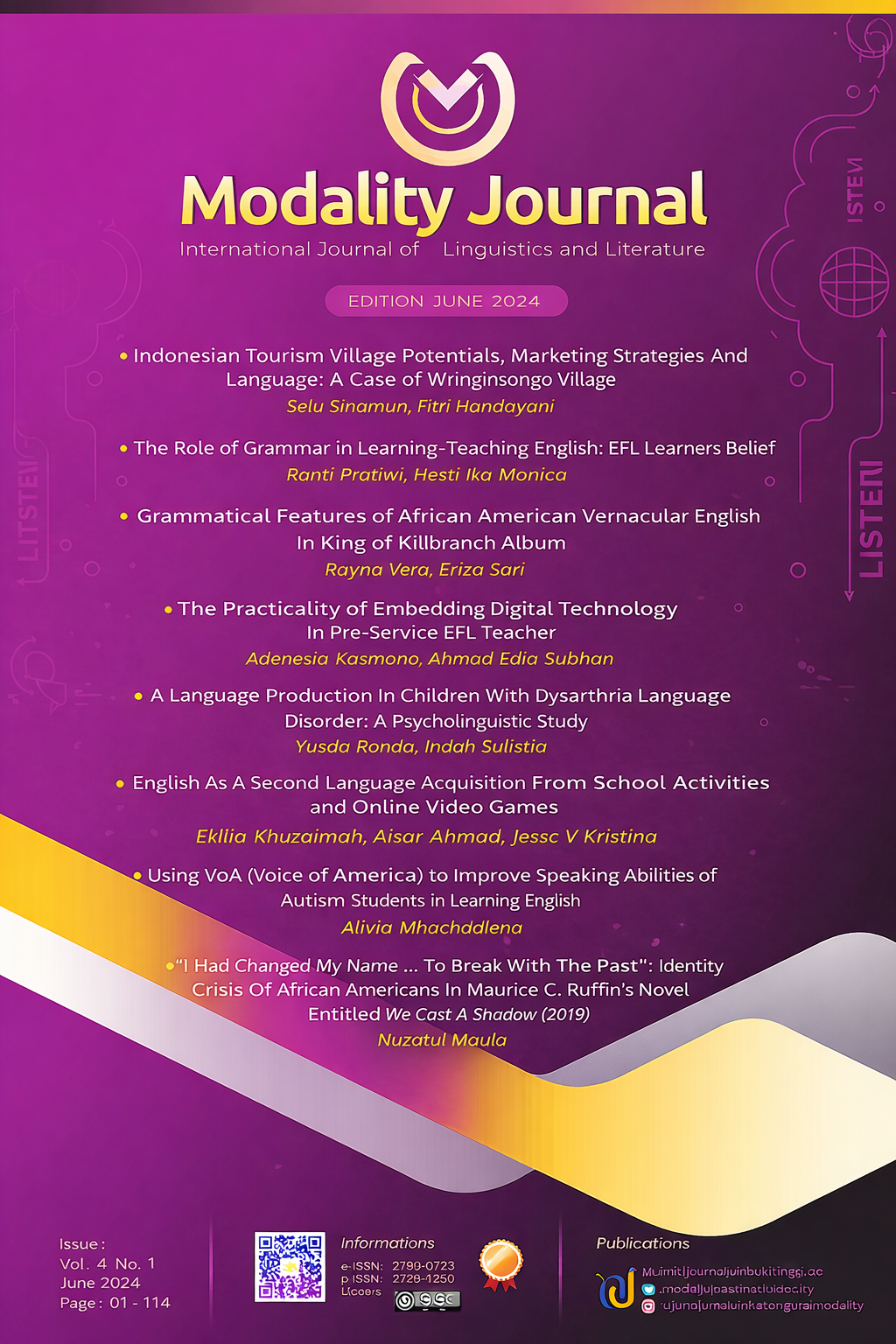Grammatical Features of African American Vernacular English In King of Killbranch Album
DOI:
https://doi.org/10.30983/mj.v4i1.8375Keywords:
grammatical features, aave, king of killbranchAbstract
This research aimed to identify and analyze the grammatical features of African American Vernacular English (AAVE) used in King Of Killbranch album by BIG30. This research also aimed to identify the most dominant grammatical feature of African American Vernacular English (AAVE) used in King Of Killbranch album. A case study method was applied to this research. The grammatical features of AAVE were analyzed based on the theories proposed by Wolfram (2004). The data analysis procedures included reading the song lyrics, sorting and identifying song lyrics that contain AAVE grammatical features, and examining the data using Wolfram's theory. The results showed that 10 grammatical features were found such as copula absence, invariant "be", completive done, sequential be done, remote “been”, simple past had+verb, specialized auxiliaries, irregular verbs, subject-verb agreement, other verb phrase structures, negation, nominals, and question formation. Furthermore, the most dominant grammatical feature of AAVE in this album is copula absence.
Abstrak
Penelitian ini bertujuan untuk mengidentifikasi dan menganalisis fitur gramatikal African American Vernacular English (AAVE) yang digunakan dalam album King Of Killbranch milik BIG30. Penelitian ini juga bertujuan untuk mengidentifikasi fitur gramatikal African American Vernacular English (AAVE) yang paling dominan digunakan dalam album King Of Killbranch. Metode studi kasus diterapkan pada penelitian ini. Fitur tata bahasa AAVE dianalisis berdasarkan teori yang diajukan oleh Wolfram (2004). Prosedur analisis data meliputi membaca lirik lagu, mengidentifikasi dan mengklasifikasikan lirik lagu yang mengandung ciri gramatikal AAVE, dan menguji data menggunakan teori Wolfram. Hasil penelitian menunjukkan bahwa ditemukan 10 ciri gramatikal seperti copula absence, invariant "be", completive done, sequential be done, remote “been”, simple past had+verb, specialized auxiliaries, irregular verbs, subject-verb agreement, other verb phrase structures, negation, nominals, dan question formation Selain itu, ciri gramatikal AAVE yang paling dominan dalam album ini adalah copula absence.
References
Amina, A., Hamza, W., & Mouro, R. (2021). African American Vernacular English Examination In Mark Twain’s Huckleberry Finn.
Arifin, J. A., & Dewi, I. I. (2023). Lexicogrammatical Analysis On African-American Vernacular English Spoken By African-American You-Tubers. E3S Web Of Conferences, 426. Https://Doi.Org/10.1051/E3sconf/202342601055
Aryani, I. T. A. (2020). African American Vernacular English (AAVE) Used By Rich Brian: A Sociolinguistic Investigation. Language Circle: Journal Of Language And Literature, 15(1), 67–72. Https://Doi.Org/10.15294/Lc.V15i1.25965
Astuti, P. P. (2018). The Use Of African-American Vernacular English (Aave) In Logic’s Everybody Penggunaan Bahasa Inggris Vernakular Afrika-Amerika Dalam Album Everybody Karya Logic. In English Language & Literature Journal (Issue 7).
Bajri, I. A., & Mishiming, J. S. (2022). Sociolinguistic Study Of The Identity Of African American Sitcom. Scholars International Journal Of Linguistics And Literature, 5(5), 160–167. Https://Doi.Org/10.36348/Sijll.2022.V05i05.002
Creswell, J. W. (2009). Research Design, Qualitative, Quantitative, And Mixed Methods Approaches. SAGE.
Foster, E. Y. (2020). Not Talking Black: African American Vernacular English And Dialect Based Smothering.
Genius. (2021, September 2). BIG30 - King Of Killbranch Lyrics And Tracklist. Https://Genius.Com/Albums/Big30/King-Of-Killbranch
King, S. (2020). From African American Vernacular English To African American Language : Rethinking The Study Of Race And Language In African American’s Speech. Annual Review Of Linguistics.
Kongsatt, R., Chaisuwan, T., Chaokuembong, K., Thalee, P., Suebtaetrakoon, A., Th, K., Th, C., & Th, P. T. (2023). An Investigation Of The Grammatical Feature Usage Of African American Vernacular English In Justin Bieber’s Songs. In Journal: Language Education And Acquisition Research Network (Vol. 16, Issue 2). Https://So04.Tci-Thaijo.Org/Index.Php/LEARN/Index
Naufal, M., & Fadhli, F. (2023). A Study Of African American Vernacular English In Movie 8 Mile.
Pamangin, R. R., Arifin, M. B., & Setyowati, R. (2023). An Analysis Of African American Vernacular English Grammatical Features In Shark Tale Film (Vol. 7, Issue 2).
Peoples, A. (2023). AAVE: Dismantling Standard American English (Part 1). Www.Sjsu.Edu/Writingcenter
Smith, M. E. (2020). African American Vernacular English And Its Presence In The American Education System.
Suyudi, I., Prasetyo Wibowo, A., & Chanafiah Pasha, L. (2023). Grammatical Analysis Of African American Vernacular English In The Eminem Show Album: A Linguistics Perspective. 9(1). Https://Doi.Org/10.31332/Lkw.V0i0
Wolfram, W. (2004). The Grammar Of Urban African American Vernacular English.
Yannuar, N., Fajriyah Priambarini, A., Wahyu Widodo, H., & Febrianti, Y. (2023). African-American Vernacular English As Hip-Hop Artist Identity In Indonesian Rapper Ramengvrl’s Songs. Kne Social Sciences. Https://Doi.Org/10.18502/Kss.V8i7.13231
Downloads
Published
How to Cite
Issue
Section
Citation Check
License
Copyright (c) 2024 Rio Raka Fatra, Anit Pranita Devi

This work is licensed under a Creative Commons Attribution-ShareAlike 4.0 International License.
Authors who publish with this journal agree to the following terms:
- Authors retain copyright and grant the journal right of first publication with the work simultaneously licensed under a Creative Commons Attribution License that allows others to share the work with an acknowledgment of the work's authorship and initial publication in this journal.
- Authors are able to enter into separate, additional contractual arrangements for the non-exclusive distribution of the journal's published version of the work (e.g., post it to an institutional repository or publish it in a book), with an acknowledgment of its initial publication in this journal.
- Authors are permitted and encouraged to post their work online (e.g., in institutional repositories or on their website) prior to and during the submission process, as it can lead to productive exchanges, as well as earlier and greater citation of published work (See The Effect of Open Access).




